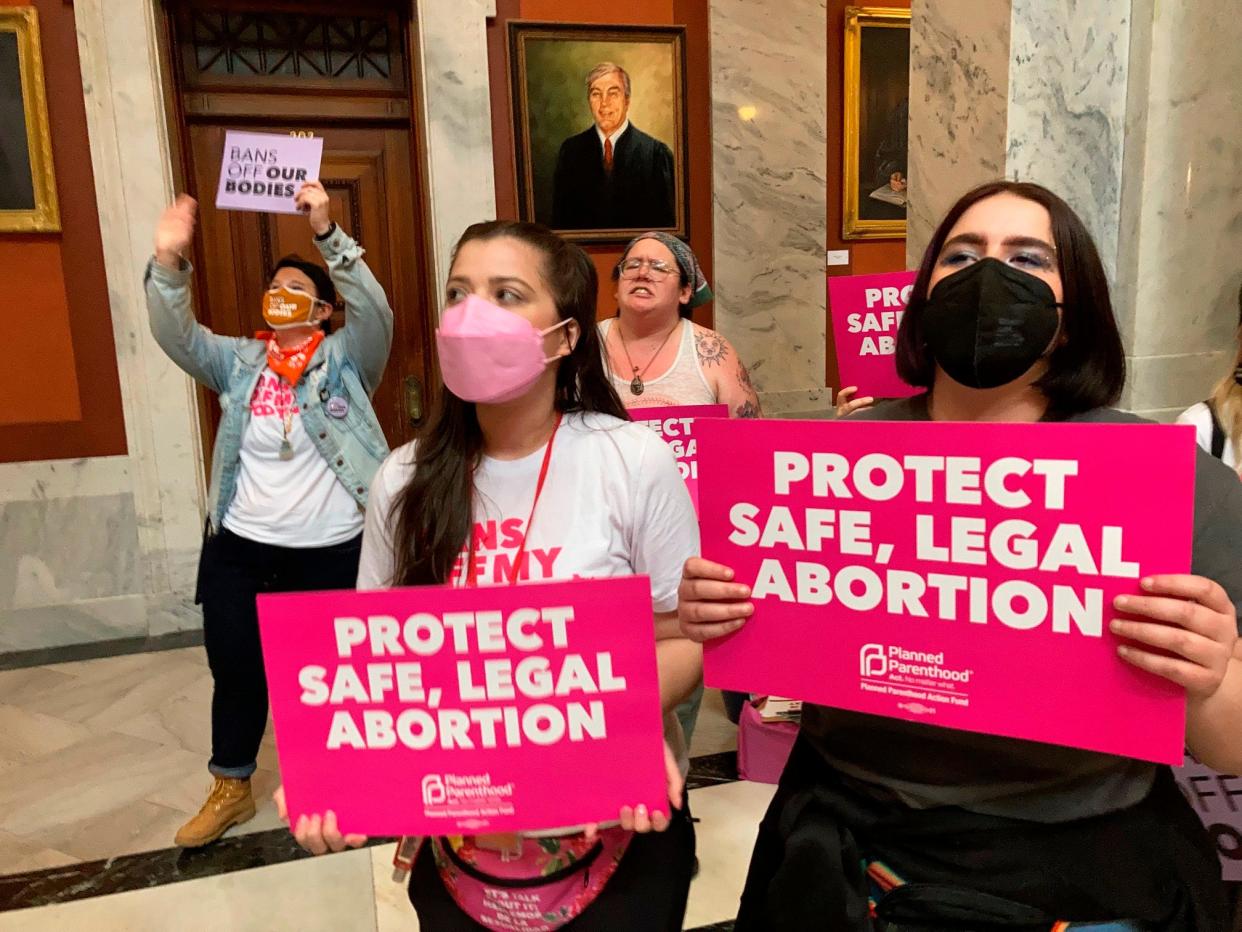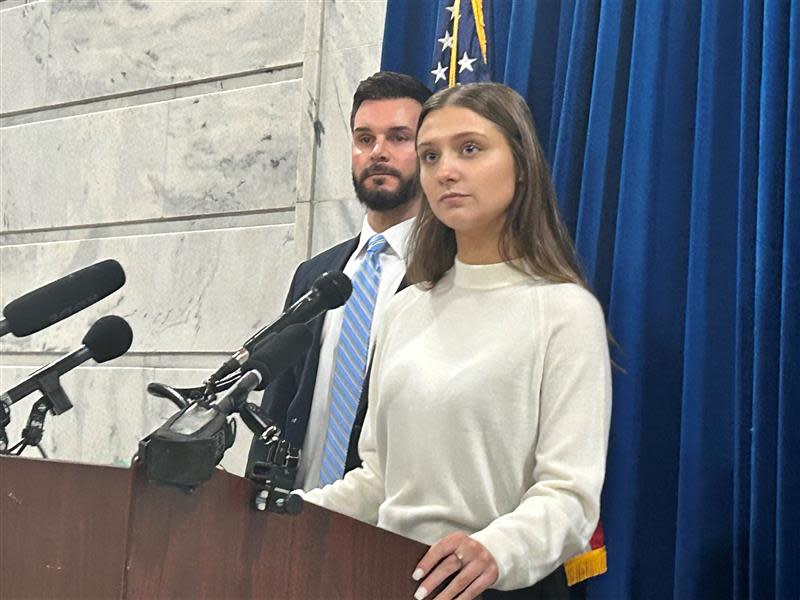Kentucky's abortion law: what it says, what it can (and can't) do, how it could change

- Oops!Something went wrong.Please try again later.
Less than two years since the U.S. Supreme Court's reversal of Roe v. Wade, some Kentucky lawmakers say the state's near-total ban of abortion across the commonwealth could still use a few tweaks.
Since abortion was struck down as a constitutional right in June 2022, abortion care has been significantly restricted in Kentucky — but that could change.
The state's six-week ban, which allows for a later abortion to be performed only to save the life of a patient or prevent disabling injury, has been a conversation amongst lawmakers since it was enacted, growing in fervor since the contentious gubernatorial race last year.
While one proposal in the statehouse could expand abortion rights to more people, other state lawmakers have been criticized as attempting to "advance an anti-abortion agenda" in the commonwealth.
Here's where abortion care stands in Kentucky and where it could go:
What is Kentucky's abortion law in 2024?
In mid-2022, Kentucky was one of the fastest states to outlaw abortion on the heels of the U.S. Supreme Court reversed its landmark 1973 decision, thanks to a preemptive state law enacted in 2019.
The commonwealth was one of about a dozen states to already have a so-called trigger law, which called for an end to all abortion services if Roe v. Wade were to ever be struck down.
Kentucky's ban bars abortions after cardiac signals can be detected from an embryo, usually around six weeks — often before people realize they are pregnant.
Under current law, an abortion is only allowed to save the life of a patient or prevent disabling injury. It contains no exceptions for victims of rape or incest. The law does not permit abortion in cases where a fetus is severely malformed and unlikely to survive.
What happened in the Kentucky ACLU lawsuit over abortion care?
Soon after the state's near-total abortion ban was in place, lawsuits by abortion care providers and advocates followed.
In December 2023, a Kentucky woman who was eight weeks pregnant sued the Commonwealth's Attorney's Office, including then-Attorney General Daniel Cameron, to overturn the state law.
The class action lawsuit was filed on behalf of the woman, identified as Jane Doe, and represented Planned Parenthood Great Northwest, Hawai‘i, Alaska, Indiana, Kentucky, along with any other person who is pregnant or could become pregnant and would want to get an abortion.
However, later that month, the woman dismissed her lawsuit soon after learning her embryo was no longer viable.
Despite the dismissal, ACLU and Planned Parenthood leaders have said they intend to continue fighting Kentucky's abortion bans.
"We won't stop fighting," the news release stated. "... We will continue to use every tool in our toolbox to restore the right to abortion for every person in Kentucky.”

What is Hadley's law? Could Kentucky's law have rape, incest exceptions?
Whether the state's near total abortion ban should remain in its current form has become a hotly debated topic.
It became a key point of contention during Kentucky's 2023 gubernatorial race between Gov. Andy Beshear and Cameron, the Republican nominee.
During Beshear's reelection campaign, the governor's camp released an advertisement that spotlighted the story of Hadley Duvall, a Kentucky woman who discussed the trauma of being raped by her stepfather and becoming pregnant at 12.
Cameron, who previously supported Kentucky's current abortion ban that requires similar victims of rape and incest to carry their pregnancies to term, seemingly reversed his stance near the tail-end of the governor's race and said he would sign a bill to add rape and incest exceptions.
Duvall has remained an advocate for abortion rights, appearing in the Capitol rotunda earlier this month with Sen. David Yates, D-Louisville, to announce a proposal that would add several exceptions to the near-total ban.
Yates, a Louisville attorney who has prosecuted rape cases, said that the rule is "so narrowly written, so ambiguous, it is almost nonexistent."
His bill, called Hadley's Law, would add exceptions in cases where maternal health was in question, along with "lethal fetal anomalies" (in which death of the infant is likely before or shortly after birth) and cases of rape and incest.
Beshear has expressed support for the bill. However, the proposal still has to be passed by the House and Senate, where both chambers have a GOP majority. The bill has not been assigned to a committee.
Rep. Jason Nemes, R-Louisville, filed a bill in the 2023 General Assembly that would have added exceptions for rape and incest, but it fell short of approval.
What about child support during pregnancy?
A bill has been filed that would allow potential mothers to claim child support during pregnancy.
House Bill 243, filed by Republican Reps. Amy Neighbors of Edmonton and Stephanie Dietz of Edgewood, would change Kentucky law to claim child support "at any time following conception."
While Neighbors says the proposal is designed to support pregnant women, some see the bill as an attempt to advance an anti-abortion agenda by laying the groundwork for fetal personhood under Kentucky law.
Rep. Lisa Willner, D-Louisville, said the bill would "grant full personhood to an embryo from the moment of conception."
"These so-called personhood laws could result in a pregnant woman facing child abuse charges and even incarceration if she seeks treatment for drug or alcohol abuse,” she said.
This bill has also received criticism from abortion-rights advocates.
"This bill is an underhanded attempt to advance an anti-abortion agenda and lay the groundwork for fetal personhood in state law by allowing people to seek child support for a fetus," said Tamarra Wieder, Kentucky state director for the Planned Parenthood Alliance Advocates.
The bill has not been assigned to a committee.
This article originally appeared on Louisville Courier Journal: Where does Kentucky stand on abortion? Lawmakers float changes in 2024

